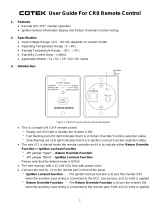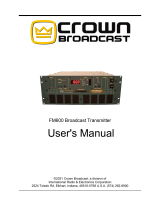Page is loading ...

INSTRUCTION MANUAL
MODEL 2779 SUBCARRIER MODULATOR
CROSS TECHNOLOGIES, INC.
6170 SHILOH ROAD
ALPHARETTA, GEORGIA 30005
(770) 886-8005
FAX (770) 886-7964
web www.crosstechnologies.com
e-mail [email protected]
Data, drawings, and other material contained herein are
proprietary to Cross Technologies, Inc., and may not be
reproduced or duplicated in any form without the prior
permission of Cross Technologies, Inc.
When ordering parts from Cross Technologies, Inc., be
sure to include the equipment model number, equipment
serial number, and a description of the part.
First Edition, JULY 1998 7/14/99 Rev A

INSTRUCTION MANUAL
MODEL 2779 SUBCARRIER MODULATOR
TABLE OF CONTENTS PAGE
Warranty ..............................................2
1.0 General.................................................3
1.1 Equipment Description..........................3
1.2 Technical Characteristics........................3
2.0 Installation ............................................4
2.1 Mechanical .......................................4
2.2 Controls and Indicators..........................4
2.3 Input / Output Signals ..........................4
2.4 Removing PCB from Extrusion................4
2.5 Installation / Operation .........................5
2.5.1 Operation .................................5
2.6 MODEL 27XX DUAL SYSTEMS..............7
2.6.1 Equipment Description ..................7
2.6.2 Model Numbers ..........................7
2.6.3 DC Power ..................................7
2.6.4 Operating Information ....................7
3.0 Circuit Description...................................8
3.1 Block Diagram Description ....................8
CROSS TECHNOLOGIES, INC.
6170 SHILOH ROAD
ALPHARETTA, GEORGIA 30005
(770) 886-8005
FAX (770) 886-7964
web www.crosstechnologies.com
e-mail [email protected]
2779 manual Rev. A Page 2 7/14/99
WARRANTY - The following warranty applies to all Cross Technologies, Inc. products.
All Cross Technologies, Inc. products are warranted against defective materials and workmanship for a period
of one year after shipment to customer. Cross Technologies, Inc.’s obligation under this warranty is limited to
repairing or, at Cross Technologies, Inc.’ option, replacing parts, subassemblies, or entire assemblies. Cross
Technologies, Inc. shall not be liable for any special, indirect, or consequential damages. This warranty does
not cover parts or equipment which have been subject to misuse, negligence, or accident by the customer
during use. All shipping costs for warranty repairs will be prepaid by the customer. There are not other
warranties, express or implied, except as stated herein.

MODEL 2779 SUBCARRIER MODULATOR
SECTION 1 GENERAL
1.1 Equipment Description- The Model 2779 Subcarrier modulator provides an FM modulated signal in the 5 to 8.5 MHz
subcarrier band at a frequency set at the factory and specified by the customer. The 2779 provides 75 microseconds emphasis,
and 50 to 150 kHz peak deviation (see model chart in section 1.2) at a 0 to +18 dBm peak program level input into a balanced
600 ohm input impedance. The output provides 50 to 250 mV p-p out into 75 ohms. Audio connectors are barrier strip and the
subcarrier output connector is BNC female. The unit is mounted on a standard 19”, 1 3/4 “ high rack mount panel and DC power
is supplied by a wall mount power supply.
CROSS TECHNOLOGIES INC.
CROSS TECHNOLOGIES INC. CROSS TECHNOLOGIES INC.
Model 2779-XX Transmitter and Model 2710-XX Receiver - Single
Model 2779-XX Transmitter and Model 2710-XX Receiver - Dual
FIGURE 1.0 Model 2779 Subcarrier Modulator
1.2 Technical Characteristics
TABLE 1.0 2779 MODULATOR SPECIFICATIONS
Characteristics Specifications*
Audio Input Characteristics
Impedance 600 ohms, balanced
Frequency 50 Hz or 15 kHz
Input Level 0 to +18 dBm at PPL (adjustable)
SC Output Characteristics
Impedance > 1.5K ohms (bridging)
Frequency range 4.5 - 8.5 MHz, factory set
Level 50 - 250 mVp-p into 75 Ω
Channel Characteristics
Deviation (see model chart below)
Pre-emphasis 75 usec
Frequency Response ≤ ±1.0 dB, 50 Hz - 15 kHz
Distortion ≤ 1 %, 1 kHz
Controls
Output level adjust 10 turn pot adjusts the subcarrier output over 50 - 250 mV p-p
Input level adjust 10 turn pot adjusts the audio deviation
Indicators
PLL/ALC Alarm Red LED (with open collector out)
Peak Deviation Yellow Led, lights at PPL audio level
Other
DC Power, max. +15VDC, 125 ma; -15VDC, 50ma; via wall power supply
RF, IF Connectors BNC, female
MODELS
TX SINGLE TX DUAL RX SINGLE RX DUAL TX + RX Peak Deviation CH. Spacing Threshold-C/No
2779-01 2779-21 2710-01 2710-21 2751-21 150 kHz 400 kHz 67
2779-02 2779-22 2710-02 2710-22 2751-22 75 kHz 250 kHz 64
2779-03 2779-23 2710-03 2710-23 2751-23 50 kHz 180 kHz 62
*+10 to +40 degrees C; Specifications subject to change without notice
2779 manual Rev. A Page 3 7/14/99

2.0 Installation
2.1 Mechanical - The 2779 Modulator PCB is packaged in an aluminum extrusion. The 2779 is mounted on a 1 3/4” X 19”
panel that can be mounted to a rack using the 4 holes at the ends. The unit derives ± 15V from the wall power supply. See
Figure 2.1.
2.2 Controls and Indicators - Figure 2.2 shows front panel controls and indicators.
2.3 Input / Output Signals - Figure 2.3 shows the input and output signals to the 2779.
2.4 Removing the Printed Circuit Board (PCB) From the Extrusion - There are no on-card jumpers or other on-
card controls. To remove the printed circuit board (PCB) from the extrusion:
1.) Remove four (4) rear
panel screws (see Figure 2.1).
2.) Gently pull the backplane and PCB assembly completely out of the extrusion.
3.) Always remove power when removing or installing the PCB in to the extrusion. Make sure the shield goes in the
lower channel and the PCB in the next channel above that in the extrusion.
4.) Gently push the backplane and PCB assembly completely in to the extrusion.
5.) Install four (4) rear panel screws.
2779 manual Rev. A Page 4 7/14/99
FRONT SCREWS (4EA,
UNDER FRONT PANEL)
RACK MOUNT PANEL
FIGURE 2.1 SERIES 2700 ASSEMBLY DRAWING
EXTRUSION
BACKPLANE
REAR SCREWS (4EA)
FRONT PANEL
PCB ASSEMBLY
WALL
POWER
SUPPLY
CROSS TECHNOLOGIES, INC.
FRONT PANEL
FASTENERS (2EA)

2.5 Installation / Operation -
2.5.1 Operation -
1.) Connect the wall power supply to the 2779 and the wall power supply to 115 VAC, 60 Hz (Figure 2.1)
2) AUDIO INPUT - Pins 16 and 17 of J4 (terminal strip on the back panel, see Figure 2.3 and Table 2.1) are
the balanced audio inputs. Pin 18 is ground.
3) SUBCARRIER OUTPUT - The subcarrier output is available on J1, the BNC connector on the back
panel (Figure 2.3). JP1 may be placed in the “TERM” position for a 75 ohm termination. If video is being
looped through, this jumper it should be placed in “non-term” (JP1 pins 2 -3) position. Use a BNC “T” to add
the subcarrier output to the video if using the high impedance loop through. Be sure a 75 Ω termination is
provided at some point in the loop, preferably at the end.
4.) The output level is adjustable from 50 to 250 mV p-p into a 75 ohm load with R65 (Figure 2.2).
Remove the front panel by unscrewing the 2 front panel knurled head screws.
5.) The alarm indicator CR1 (Figure 2.2) will illuminate if the output level is adjusted beyond the ALC range of
the module. It will also illuminate if the PLL comes out of lock.
6.) The peak deviation indicator, CR8 (Figure 2.2) flashes when the modulator exceeds 150 kHz /peak
deviation. With R10 (Figure 2.2) adjust the input level so that the peak deviation indicator flashes occasionally
on modulation peaks
2779 manual Rev. A Page 5 7/14/99
FIGURE 2.2 2779 Front Panel Controls and Indicators
R65- SC Output
Level Adjustment
- Ten turn
potentiometer that
adjusts the subcarrier
output level. It can be
adjusted for 50 to 250
mV p-p into 75 Ω.
CR1 - Alarm LED -
Lights red when PLL
comes out of lock or
the output is not ALC’d
CROSS TECHNOLOGIES, INC.
CR8 - Peak Deviation LED -
Lights yellow when the audio
exceeds levels for peak deviation at
PPL and audio is limited
R10- Audio Level
Adjustment - Ten
turn potentiometer
that adjusts the audio
level for the proper
deviation. It should be
set so the Peak
Deviation LED, CR8
occasionally lights on
program material

2779 manual Rev. A Page 6 7/14/99
J2
FIGURE 2.3 2779 Inputs and Outputs
J4 - I/O BARRIER STRIP - Provides connections for
audio, data, alarm signals, etc. Pin numbers are as shown
upside down on the connector. See Table 3.2
J2 - DC IN - The
+15 VDC AND -15
VDC regulated DC
voltage from the
wall power supply
-15 +15
GND
J1 - BNC IN/OUT - Signal from pin 2 or 3 (as
set by strap beside J1) of PCB which is for
subcarrier, video, IF and RF signals.
JP1 - J1 OUTPUT
TERMINATION
TERM = 75Ω TERMINATION
2 - 3 = NO 75Ω TERMINATION
1 2 3
JP1
TERM
J4
TABLE 2.1 INPUT AND OUTPUT SIGNALS
TABLE 2.1 INPUT AND OUTPUT SIGNALS
CONNECTOR GENERAL FUNCTION 2779 FUNCTION COMMENTS
J1 BNC IN/OUT SUBCARRIER OUTPUT 50 TO 250 MV P-P
J2 DC IN DC IN ± 15 VDC, 3PIN MINI-DIN
J3 PCB EDGE CONNECTOR PCB EDGE CONNECTOR INTERNAL USE
J4 - PIN
1 GROUND GROUND
2 BB IN/OUT NOT USED
3 RF/IF OUT/IN. NOT USED
4 +AUDIO - L; +CLK NOT USED
5 -AUDIO - L; -CLK; RS232 NOT USED
6 MISC; AGC; CC; BCD-0 NOT USED
7 UNBAL AUDIO - L. NOT USED
8 MISC; CC; BCD-1 NOT USED
9 +15 VOLTS. +15 VOLTS.
10 MISC; CC; BCD-2 NOT USED
11 -15 VOLTS -15 VOLTS
12 MISC; CC; BCD-3 NOT USED
13 UNBAL AUDIO - R. NOT USED
14 MISC; CC; NOT USED
15 ALARM; CC. ALARM OPEN COLLECTOR (+30 VDC, 30ma MAX).
16 +AUDIO - R ; +DATA. +AUDIO IN 0 to +18 dBm PPL, 600Ω balanced
17 -AUDIO - R ; -DATA; RS232. -AUDIO 0 to +18 dBm PPL, 600Ω balanced
18 GROUND GROUND

2.6 MODEL 27XX DUAL SYSTEMS
2.6.1 Equipment Description- The Model 2779 Subcarrier modulator and 2710 Subcarrier demodulator provides
modulation and demodulation of an FM modulated signal in the 5 to 8.5 MHz subcarrier band at a frequency set at the factory and
specified by the customer. The unit is mounted on a standard 19”, 1 3/4 “ high rack mount panel and DC power is supplied by a
wall mount power supply. As the table of Figure 2.5 shows these are available as two units per standard 19”, 1 3/4 “ high rack
mount panel. For the 2751-XX Series with one modulator and and demodulator the modulator is usually on the left as you face
the front.
CROSS TECHNOLOGIES INC. CROSS TECHNOLOGIES INC.
Model 2779-XX Transmitter and Model 2710-XX Receiver - Dual
FIGURE 2.4 Model 2779 Subcarrier Modulator
2.6.2 MODEL NUMBERS
DUAL MODEL CONFIGURATIONS
DUAL MODEL CONFIGURATIONS
DUAL MODEL CONFIGURATIONS
DUAL MODEL CONFIGURATIONS
MODULES MAKING THIS
MODULES MAKING THIS
MODULES MAKING THIS
MODEL 2710-01 2710-02 2710-03 2779-01 2779-02 2779-03
DUAL RX
2710-21 2 - - - - -
2710-22 - 2 - - - -
2710-23 - - 2 - - -
DUAL TX
2779-21 - - - 2 - -
2779-22 - - - - 2 -
2779-23 - - - - - 2
RX + TX
2751-21 1 - - 1 - -
2751-22 - 1 - - 1 -
2751-23 - - 1 - - 1
FIGURE 2.5 Model 27XX Model Numbers
2.6.3 DC POWER - Generally the 27XX series will have one wall power supply that can be connected to J2 of either
module and have pins 9 (+15 Volts DC), pins 11 (-15 Volts DC) and pins 1 (ground) connected together as shown in Figure 2.6
below. You can power the modules from individual power supplies by ordering another one from Cross Technologies, Inc. and
disconnecting the jumpers that connect these pins.
2.6.4 OPERATING INFORMATION - Refer to the individual module manuals for detailed operating instructions
J2
1 2 3
JP1
TERM
J4
J2
1 2 3
JP1
TERM
J4
FIGURE 2.6 Model 27XX Rear Panels Showing DC wired together for Use With One Wall Power Supply
2779 manual Rev. A Page 7 7/14/99

3.0 Circuit Description
3.1 Block Diagram Description - 2779 (Figure 3.1) -
The subcarrier modulator generates a frequency modulated carrier in the 4.5 to 8.5 MHz range for use in a subcarrier
transmission system. Its output power is variable, permitting various injection levels. Refer to Figure 3.1 and the following
detailed description.
The FM oscillator is a varactor tuned, modified Colpitts oscillator whose frequency is stabilized by a phase locked-loop (PLL) to
a crystal reference. The output from the FM oscillator is amplified in the ALC amplifier to a sufficient level for use in the
transmission system. The bandpass filter is a three pole LC filter with a bandwidth sufficient to pass the FM carrier and its
significant sidebands. An emitter follower isolates the output from external conditions. The output impedance is relatively high
(nominally 2 k ohms), permitting bridging onto a low impedance baseband with minimal loading. A portion of the output is
sampled for control of the alarm and mute circuit. Should the unloaded carrier level decrease below 40 mV p-p either by failure,
loading, or external mute, the ALC and muting circuit biases the ALC amplifier off and activates the alarm circuitry. The alarm
circuit consists of several logic gates which monitor the PLL performance and status of the ALC bias. Should the PLL break
lock, U4 detects the PLL state and:
a. Biases Q3 on for external alarm indications.
b. Illuminates CR1 to provide a visual indication of alarm
c. Biases U5B positive which, in turn, shuts off the ALC amplifier.
The external mute (available in some models) forces a similar condition and causes alarm conditions
The PLL system maintains frequency stability of the FM oscillator. A portion of the FM oscillator output is sampled in U3; the
crystal standard oscillator is sampled in U1. The resulting square waves OUT of U1 and U3 respectively are processed in the
PLL, U2. The PLL attempts to maintain phase lock between U3 and U1 outputs by providing a DC bias which is filtered in the
PLL filter, and applied to the varactor diode in the FM oscillator. The summing junction, U6B, sums the modulating frequency
with the DC bias, then applies the composite baseband to the varactor diode, CR7. The center frequency of the FM oscillator is
dependent on the DC component of composite baseband provided by Vref, which stabilizes the capacitance of CR7. The PLL
filter has a very slow time constant which prevents excessive frequency shift of the FM oscillator due to modulation.
The audio processor on the subcarrier modulator provides pre-emphasis, filtering, and precision clipping of the program should
program level exceed deviation specifications. The pre-emphasis circuit, U1B, provides standard 75 microsecond pre-emphasis.
The LPF, U2, is a 4 pole Sallen and Key synthesis of the Chebychev function for low pass filtering, whose response is +1 dB
50 Hz to 15 kHz. The precision clipper is set such that any signal whose level after pre-emphasis exceeds 100% deviation will be
clipped to prevent over deviation. The peak detector illuminates CR8 upon clipping.
2779 manual Rev. A Page 8 7/14/99

2779 manual Rev. A Page 9 7/14/99
/




